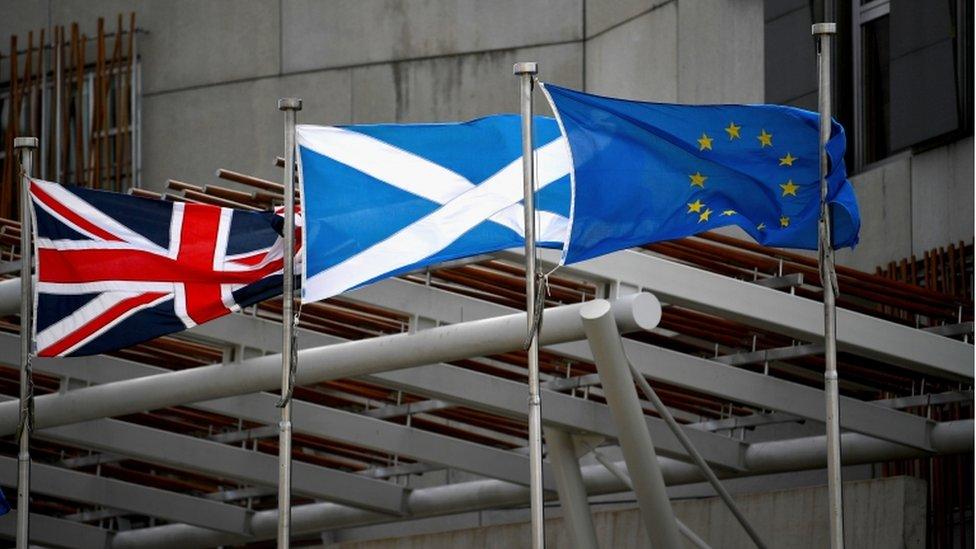Movement on Brexit row - but no deal, yet
- Published

Are there signs of movement in the long-running row over the return of EU powers to Scotland, post Brexit? Yes there are.
Are we close to a settlement? Depends to whom one talks.
A senior Conservative vouchsafed to me this evening that a deal was "very near." But a Scottish government insider was much more cautious, stressing the fundamental concerns which remain.
Where could the deal lie? You will recall that the controversy centres upon 111 powers in devolved areas which are currently administered in part by the European Union, which fall under an EU framework.
Initially, the UK government had said those powers should return to London prior to the establishment of UK frameworks, where necessary, and the subsequent redistribution of said powers.
Returned with a caveat
Scottish Ministers called that a "naked power grab". And, to indicate that this is much more than a Nationalist issue, the Labour administration in Wales was, if anything, more excoriating still.
Both Wales and Scotland regarded the proposal as running counter to the basic nature of the devolution settlement. Northern Ireland devolution is, of course, currently on hold, at least in terms of political power-sharing.
And so there has been a change. As I disclosed some weeks ago - when the issue was last discussed by ministers - the proposal in the EU Withdrawal Bill has been flipped.
The devolved powers will be returned to Scotland, Wales and NI. But with a caveat.
The latest round of talks between the Scottish and UK governments will be held on Thursday
You will not be surprised to learn that it is the caveat which is causing contention. Indeed, the two sides tend to describe it in different terms, exemplifying their different standpoints.
Talk to sources in the Scottish government - and they describe the caveat as a "veto". Talk to sources in the UK government and they talk of a "backstop".
Stability and credibility
So what is intended? The idea is that the powers would be returned to the devolved administrations - but the UK government would retain supervision over certain of those powers in the first instance.
In essence, to avoid initial disparity, UK Ministers would insist upon the adherence to EU rules - essentially replicating the EU framework, at first.
This would not apply to all the powers or anything like the totality. But it would be key powers such as agriculture, fisheries, food labelling and others.
UK Ministers said that, from day one and in the transition, business needs a degree of stability and certainty. They need to know that the rules which affect trade will be common across the UK.
Eventually, UK Ministers say that would be done by agreed frameworks. Initially, in essence, they intend to enforce it. That is their backstop - which Scottish Ministers regard as an unacceptable veto.
The core issue? Who decides. Scottish Ministers say that, even initially, the rules on common operation need to proceed by formal agreement with the devolved administrations, not by a UK decision. Even one influenced by consultation.
UK Ministers say they have moved substantially to alleviate the concerns of a power grab. Scottish Ministers acknowledge that but say: not far enough.
As I write, with the Joint Ministerial Committee on European negotiations due to meet tomorrow, a deal looks measurably closer. But not there yet.